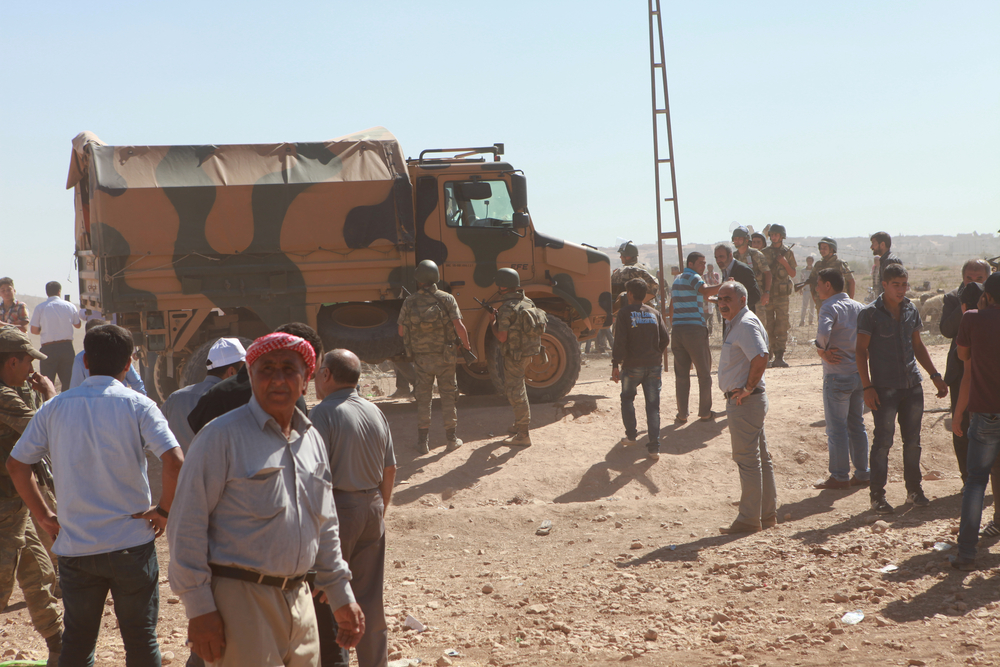Breaking
US-led airstrikes hit Syria oil refinery by Turkey

SURUC, TURKEY-SEPTEMBER 20, 2014: Turkey opened its border to Syrians fleeing the town of Kobane in fear of an Islamic State attack. Tens of thousands have fled to Turkey on September 20, 2014. (fpolat69 / Shutterstock)
SANLIURFA, Turkey — Airstrikes likely carried out by the U.S.-led coalition struck an oil refinery in Syria held by the Islamic State group on Sunday, shaking buildings and sending flames shooting into the air near the Turkish border, a witness and activists said.
Al-Qaida’s Syrian affiliate meanwhile warned that Muslims would attack countries taking part in the coalition air raids, which have targeted both the Islamic State extremist group — with which al-Qaida is at war — as well as hardline militants battling to overthrow Syrian President Bashar Assad.
Explosions lit the sky for two hours at the refinery in the northern Syrian town of Tel Abyad around 2:30 a.m. local time (2330 GMT Saturday), said Turkish businessman Mehmet Ozer, who lives in the nearby Turkish town of Akcakale.
“Our building was shaking and we saw fire, some 60 meters (65 yards) high, coming from the refinery,” he said. The strikes were also reported by the Britain-based Syrian Observatory for Human Rights and Turkey’s Dogan news agency. Dogan said the strikes targeted an oil refinery and the local headquarters of the Islamic State group.
U.S. Central Command, which is overseeing the air campaign, did not immediately comment on the strikes.
The U.S.-led coalition has been targeting oil installations across Syria controlled by the extremist group, aiming to cripple its finances. The group is believed to earn some $3 million a day from selling smuggled oil on the black market as well as kidnapping and extortion.
The United States and five Arab allies launched an aerial campaign against Islamic State fighters Tuesday with the aim of rolling back and ultimately crushing the extremist group, which has created a proto-state spanning the Syria-Iraq border. The U.S. has been carrying out airstrikes against the group in neighboring Iraq since August.
In seizing territory, the Islamic State group has massacred and beheaded its opponents, chased out tens of thousands of Syrians and Iraqis who belong to minority groups and imposed a harsh interpretation of Islamic law on residents,
The Islamic State group has also abducted Syrian activists, international aid workers and journalists, and has beheaded a British aid worker and two American reporters.
The coalition includes Saudi Arabia, Bahrain, the United Arab Emirates, Qatar and Jordan. Several European countries also are contributing to U.S. efforts to strike the Islamic State group in Iraq, including France, the Netherlands, Denmark, Belgium and Britain.
The campaign against the oil facilities is expected to be a long, slow task as most of the refineries held by the Islamic State group are small and scattered across their territory.
The Britain-based Observatory says at least 19 civilians have been killed so far in coalition strikes in Syria. Most recently, six oil workers in the far northeast province of Hassakeh were killed overnight, said the Observatory, which obtains information from a network of activists on the ground.
Overall, some 190,000 people have been killed in Syria’s three-year conflict, and nearly one-half of the country’s pre-war population of 23 million people has been displaced.
In Syria, the strikes are also targeting the Nusra Front, al-Qaida’s official branch in the country.
Washington views the group as a terrorist organization, while most Syrian rebels see it as a highly effective ally against both President Bashar Assad’s government and the Islamic State extremist group, which has been rejected by al-Qaida’s central leadership.
The Nusra Front’s ultimate goal is to impose Islamic law in Syria. But unlike the Islamic State group, it has fought alongside other rebel groups, seeing the overthrow of Assad as its first priority.
On Sunday, a spokesman for the Nusra Front warned that jihadists around the world would strike back against the coalition.
“This will have a response,” spokesman Abu Firas al-Souri said in a video uploaded to social media networks by Nusra loyalists. “These countries undertook an ugly act that will place them on the lists of targets for jihadi forces all over the world.”
Al-Souri said the strikes on the Nusra Front were “against the Syrian people… who rose against the oppressor and fought in the way of God.”
Al-Souri’s speech was preceded by mournful music and images of what appeared to be dead Nusra fighters and rubble from bombing. The video appeared genuine and corresponded to Associated Press reporting.
Syrian rebels have expressed anger at the coalition airstrikes, both because they have targeted the Nusra Front — which they see as an ally — and because they are not hitting forces loyal to Assad, which are the best placed to benefit from any rolling back of the Islamic State group.
—
Diaa Hadid contributed reporting from Beirut and Suzan Fraser from Ankara.





















